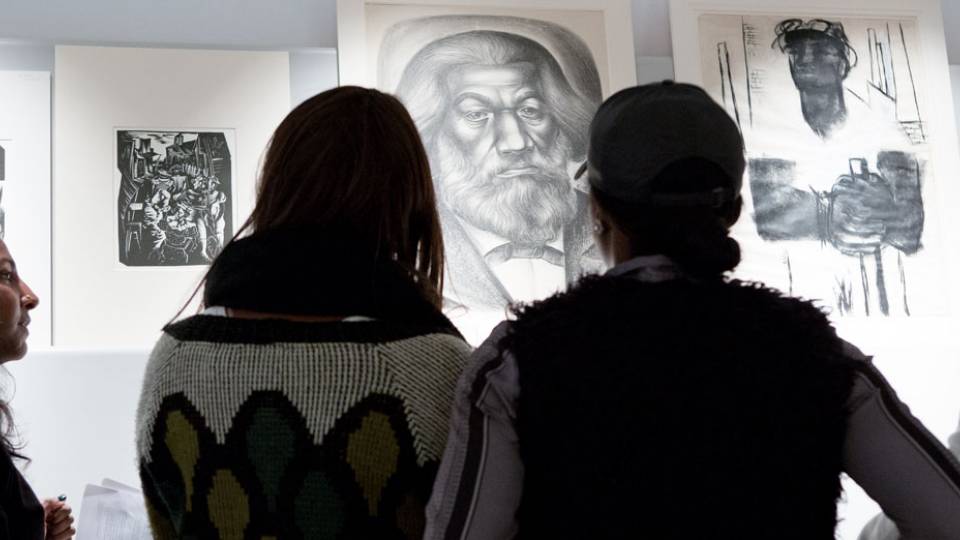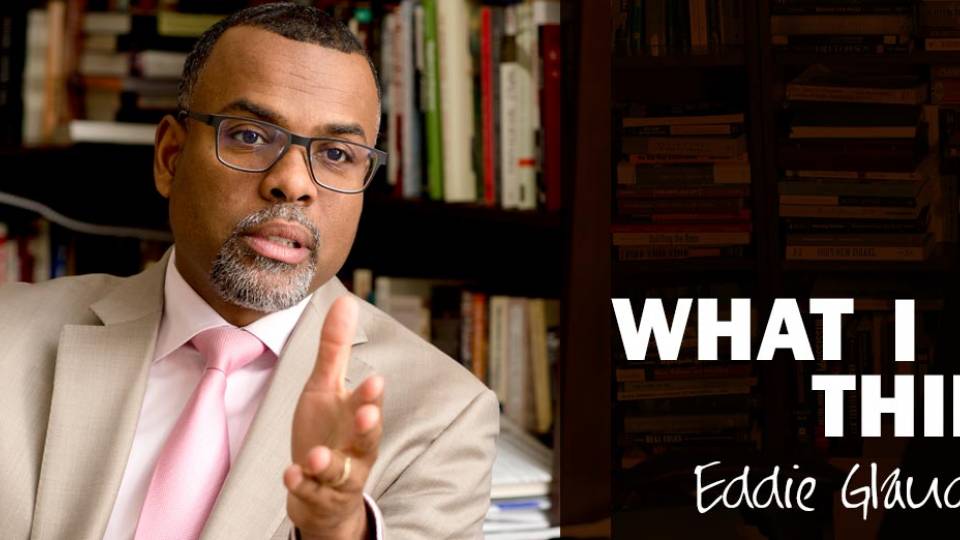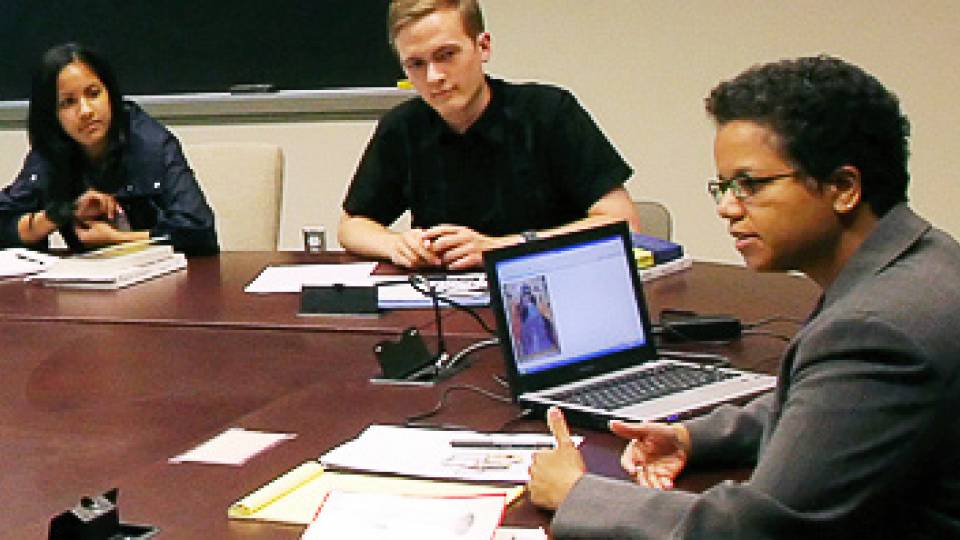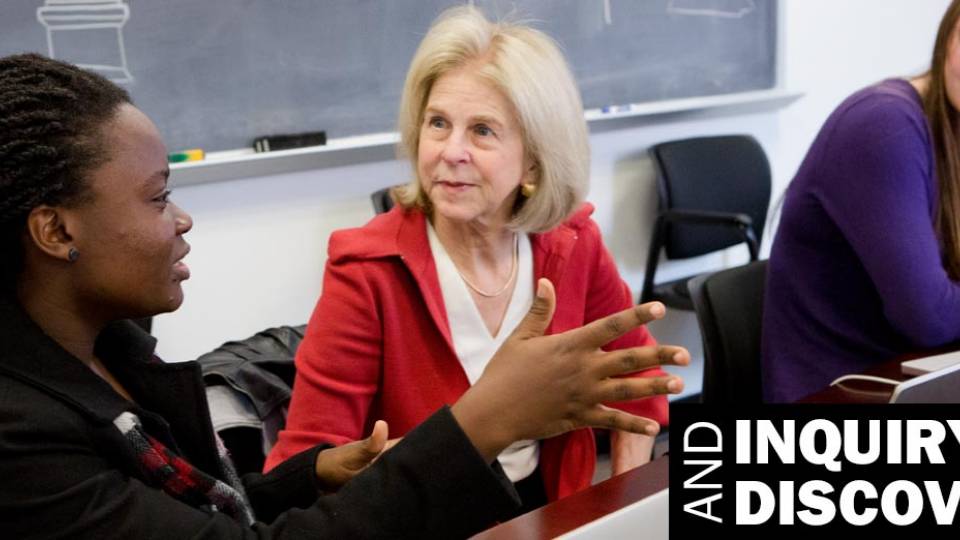Faith Temple No. 2 Free Will Baptist Church has been a starting point for many of the paths in Wallace Best’s(Link is external) life.
Growing up in the Washington, D.C., area, the Princeton religion scholar first encountered the church as his childhood place of worship. The church inspired his desire to be a minister, which led him to Washington Bible College. As his career goals shifted, a graduate school paper on the history of the church spurred his passion for further study of African American religious history.
“The church did not exist on an intellectual plane” but a spiritual and emotional one in his experiences, said Best, a professor of religion(Link is external) and African American studies(Link is external). “Once I found out that there were questions to be asked, and that there were answers to these questions, and that there were rich materials to read and analyze, there was no turning back.”
Best’s passion is evident in his many activities. Since arriving at Princeton in 2007 from Harvard Divinity School, he has taught courses on spiritual narratives by black women, religions of the Americas and African American religious history, among others. He also has organized a lecture series on black gospel music. This semester he is teaching a course on the Nation of Islam and serving as the director of graduate studies in the religion department, as well as advising undergraduates. In addition, Best is writing a book on the religious writings and thought of Langston Hughes.
As a member of the Department of Religion and the Center for African American Studies, he joins a group of Princeton scholars that include Albert Raboteau, Judith Weisenfeld and Eddie Glaude at the forefront of his field. Trained as a historian and working in religion, Best fits the interdisciplinary nature of the Center for African American Studies, which Glaude chairs.
“Wallace is one of the most important American historians of religion in the country of his generation,” said Glaude, the William S. Tod Professor of Religion and African American Studies. “Wallace can move across the traditional archive of history to performance studies, with his series on black gospel music, to the literary imagination of Langston Hughes, all the while being attentive to the various ways religious meanings are being produced.”
He passes on these talents to his students, while actively engaging in the center as a warm, friendly colleague, Glaude said. “We are blessed to have him here.”

Best challenges his students’ assumptions about African American religion, relying on texts, photos, music and anything else that brings the material to life. “There are levels of richness to this tradition that you don’t know and that you won’t know until we open up these texts,” he said.
Church community and history
The success Best is enjoying has been long in coming and was unexpected, to him most of all. He was the 14th of 15 children; his father, Leviticus, was a sharecropper on a North Carolina farm, as was his father’s grandfather, a former slave. His mother, Queen, was an unskilled worker often holding down multiple jobs. When he was 2 years old, the family moved to Washington, D.C. Though his father was attached to farming the land and the South -- an attachment shared by many blacks of his generation -- his older siblings, most of whom had left the farm for the city, convinced his father to come north for a better life. In Washington, Best’s father worked as a butcher for many years, and later as a vendor, selling fresh produce in low-income areas without grocery stores. Best’s mother held a variety of jobs, from retail to domestic to maintenance work, until she joined the maintenance staff at the National Institutes of Health and rose through the ranks to a supervisory level.
His family had moved to an enclave of working-class former North Carolinians whose community centered on its Baptist church. Best grew increasingly involved in the church, serving as head of the gospel choir, and felt “a call to preach.”
“When I first walked into the doors [of the church] I soon became committed to the place. It was wondrous and fascinating. Never had I seen such joy on people’s faces” despite their economic hardships, he said. “It was so formative in my own life. It continues to shape the way I think about communities and about black religion, which I know now to be so much more than African American Christianity.”
Entering a world foreign to his parents, neither of whom had attended college, Best enrolled at Washington Bible College, a small, fundamentalist school in Maryland that emphasized intense Bible study. His education included learning biblical Greek and theology, and writing out entire chapters of the Bible, charting them with graphs and symbols.
“I then and now find the study of the Bible fascinating,” Best said, but “I learned through the process that the last thing on earth I ever wanted to be was a preacher.”
After graduating, Best took several years off to work, landing at the post office in San Diego. His favorite teacher at Washington had attended Wheaton College, and Best wanted to pursue a master’s degree in theological studies at the Illinois school. He figured he would return to the post office after graduate school rather than pursue further study. Yet when he enrolled at Wheaton in 1990 and began to learn about African American religious history, that changed.
First, Best wrote a paper on the history of his D.C. church. Then, he wrote his master’s thesis on the founder of the African Methodist Episcopal Church, Richard Allen. His adviser, Mark Noll, a noted scholar of the history of Christianity and now the Francis A. McAnaney Professor of History at the University of Notre Dame, noticed Best’s energy and progress.
“His work was very good. I can think of maybe three students at Wheaton, in my 25 years working with master’s students, where the trajectory was so positive,” Noll said. “It did seem for someone who matured so rapidly as a scholar in just a couple of years, he should consider to go on. I’m just pleased that the trajectory kept going after he left Wheaton College.”
Best entered the history program at Northwestern University. As he learned about the Great Migration and about whole communities moving from the rural South to the urban North, he realized the parallels to his own family’s history. His dissertation focused on the central role religion played in the Great Migration and the transformation of church culture in Chicago. It became his first book, “Passionately Human, No Less Divine: Religion and Culture in Black Chicago, 1915-1952,” which won the 2006 Illinois State Historical Society Award. By 1920, he wrote, census figures showed that 83 percent of blacks in Chicago were born outside of Illinois.
“If you’re going to make an argument about the broad changes this demographic shift brings about, you’ve got to talk about the broad changes in the central institution among these people,” Best said. “The lower-class and working-class culture of these Southern migrants began to dominate the entire culture.”

Senior Jonathan Nussbaum said Best “seems to genuinely care what it is we are contributing to the class. There is a sense that we are moving through the material together as a group.” Best also meets often with students outside of class, such as this session with (from left) Nussbaum, senior Saba McCoy and sophomore Angela Groves.
Nancy MacLean, a professor of history and African American studies at Northwestern, served as Best’s adviser and remembers him as an unusually resourceful researcher. For example, in 1997 Best was able to convince the family of one of his subjects, a Pentecostal pastor named Elder Lucy Smith, to donate her papers to the Chicago Public Library for other scholars’ benefit, MacLean said.
“That’s not something a graduate student usually does. It’s a sign of the generosity of spirit that characterizes Wallace’s relations with everyone,” MacLean said. “He’s an extremely diligent scholar, and he wrote a wonderful dissertation and book that made a very important contribution to American religious history, African American religious history and the history of Chicago. He approached it in a very creative way, with ethnographic sensitivity and careful attention to gender and class and the way they affected the African American experience.”
After Northwestern, Best taught at the University of Virginia, took fellowships at the Center for the Study of Religion at Princeton and the W.E.B. DuBois Institute at Harvard, and taught for three years at Harvard Divinity School.
At Harvard, he began working on his next book, a study of the religious thought of Langston Hughes titled “Langston’s Salvation: American Religion and the Bard of Harlem.” Hughes is remembered as a radical social poet, Best said, but over the span of his 40-year career he also wrote about religion in works such as the still-popular gospel play “Black Nativity.” Hughes lost his faith in Christian beliefs at an early age, Best argues, but he developed a broader philosophy of religion.
“It’s a book where I’m trying to do justice to the religious thought of Langston Hughes as seen in his poems, stories and gospel plays,” Best said. “African American religion has been dominated by voices of people who speak from the perspective of religious belief, tradition or conventional faith while the voices of nonbelievers have been silenced. In some sense, the highest aim of the project is to understand African American religion in a different light.”

Best’s course “The Nation of Islam in America” takes a broad look at the cultural and religious practices of the movement, as well as its charismatic leaders such as Malcolm X, subject of the books in the foreground.
An educational home
Best was eager to return to Princeton when he was offered the opportunity to work with the extensive community of scholars at the University. As a cultural historian citing anthropology and sociology one day and writing about literature the next, he finds it particularly important to be comfortable crossing fields.
“That interdisciplinary cooperation is one of the signature features of Princeton,” Best said. “It’s encouraged from the president, Shirley Tilghman, all the way down.”
That approach shows in his teaching, where a recent session of his class on the Nation of Islam covered the theological and political evolution of Malcolm X -- and related it to fashion, food, music and psychology.
“Regarding the meaning of Malcolm X, is he dangerously close to losing any meaning because he’s called on to mean so many things?” Best said as he wrapped up his lecture. “X hats were taken quite seriously as symbols of a type of black militancy. What is the state of black politics when it can be contained on your hat?”
Such provocative questions have led senior Saba McCoy to spend time after class in discussion with other students.
“I think what’s been great about this class is that Professor Best has been very good about starting conversations … and they go into all kinds of directions,” she said. “The Nation of Islam is not considered by many to be an actual religion, so we’re looking at it through history, theology and politics. It’s very clear through his course that these lines blur, which is the way it is in real life, so it’s wonderful.”
Students also said they contribute to the discussions because of Best’s personal touch.
“He greets each student by name and seems to genuinely care what it is we are contributing to the class,” said senior Jonathan Nussbaum. “There is a sense that we are moving through the material together as a group.”
Best also tries to challenge the students’ personal assumptions about the material.
“Some students feel that they’ve been confronted with this tradition and these ideas before. They come with a certain set of ideas about what African American religion is,” Best said. “I always discourage that on the first day of class. Forget what you know. There are levels of richness to this tradition that you don’t know and that you won’t know until we open up these texts.”
Best’s sense of wonder is intact as he continues his teaching, advising and research at Princeton, a long way from Faith Temple No. 2 Free Will Baptist Church.
“I’ve been very fortunate,” he said. “I never thought this would happen to the son of a sharecropper. Believe me.”






